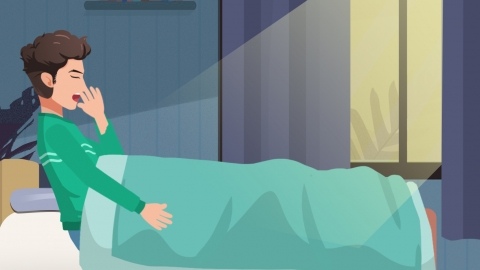What causes a headache at the back of the head to improve after sleeping?
Generally, a headache at the back of the head that improves after sleeping may be caused by localized cold exposure, insufficient sleep or excessive fatigue, occipital neuralgia, migraine, cervical spondylosis, and other conditions. If discomfort occurs, it is recommended to seek medical attention promptly and undergo appropriate treatment under a physician's guidance. A detailed explanation is as follows:

1. Localized Cold Exposure
If windows and doors are not properly closed or the pillow is too cold during sleep, the low indoor temperature may cause exposure of the back of the head to cold air or cold stimuli, resulting in pain. The pain is usually intermittent and mild. Patients can relieve symptoms by applying local heat. It is important to stay warm and avoid direct exposure to cold drafts in daily life.
2. Insufficient Sleep or Excessive Fatigue
Long-term lack of sleep, staying up late, or excessive fatigue may lead to insufficient blood supply to the brain, causing pain at the back of the head, possibly accompanied by fatigue, difficulty concentrating, and memory decline. After rest, cerebral blood supply returns to normal and the pain subsides. It is recommended to perform appropriate neck massage and stretching exercises to help relieve muscle fatigue and prevent pain.
3. Occipital Neuralgia
The occipital nerves are responsible for transmitting sensory signals from the back of the head. When these nerves are compressed or inflamed, pain in the back of the head can occur. During sleep, changes in head position may reduce pressure on the occipital nerves, thereby alleviating pain. It is recommended to follow medical advice and use medications such as ibuprofen sustained-release capsules, carbamazepine tablets, or diclofenac sodium sustained-release tablets to relieve symptoms.
4. Migraine
Migraine is a common type of headache that may be related to various factors such as endocrine changes, diet, and environment. During a migraine attack, pain may occur in the back of the head. Sleep can help restore the brain's balance and relieve pain. It is recommended to use medications such as nimodipine tablets, compound propranolol caffeine tablets, or topiramate tablets under a physician's guidance for treatment.
5. Cervical Spondylosis
Cervical spondylosis refers to degenerative changes in the cervical spine structure, such as intervertebral disc herniation and bone spur formation. These changes may compress nerve roots, leading to pain and discomfort. During sleep, changing the position of the head and neck can reduce pressure on the nerve roots, thereby alleviating pain. It is recommended to follow medical advice and use medications such as chlorzoxazone tablets, eperisone hydrochloride tablets, or sodium naproxen tablets for treatment.
It is recommended to maintain a quiet bedroom environment conducive to sleep and to maintain a regular sleep schedule, which can help alleviate symptoms.




